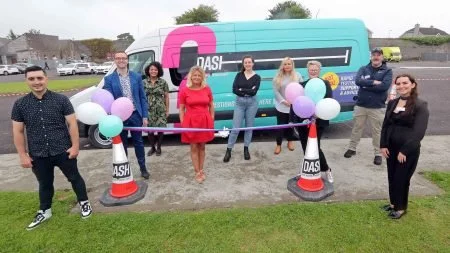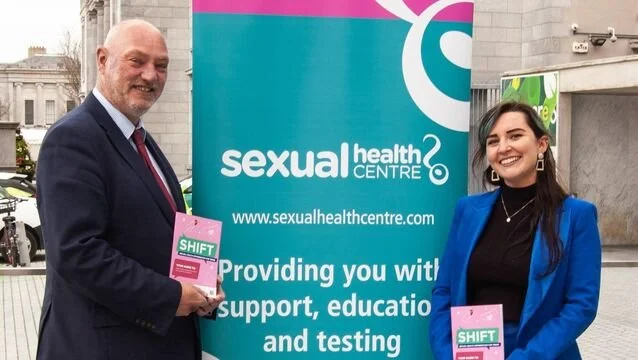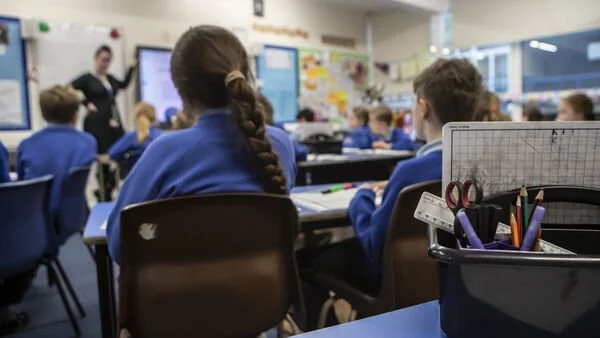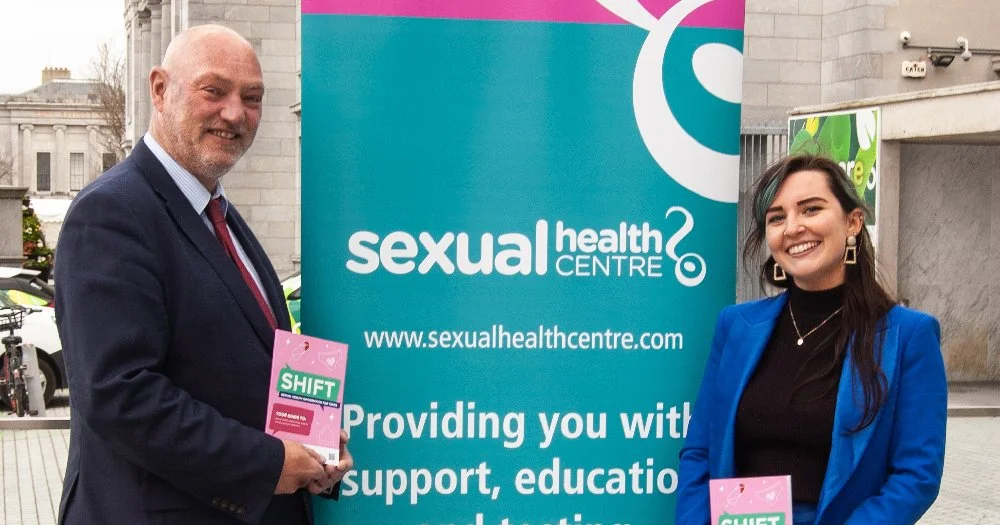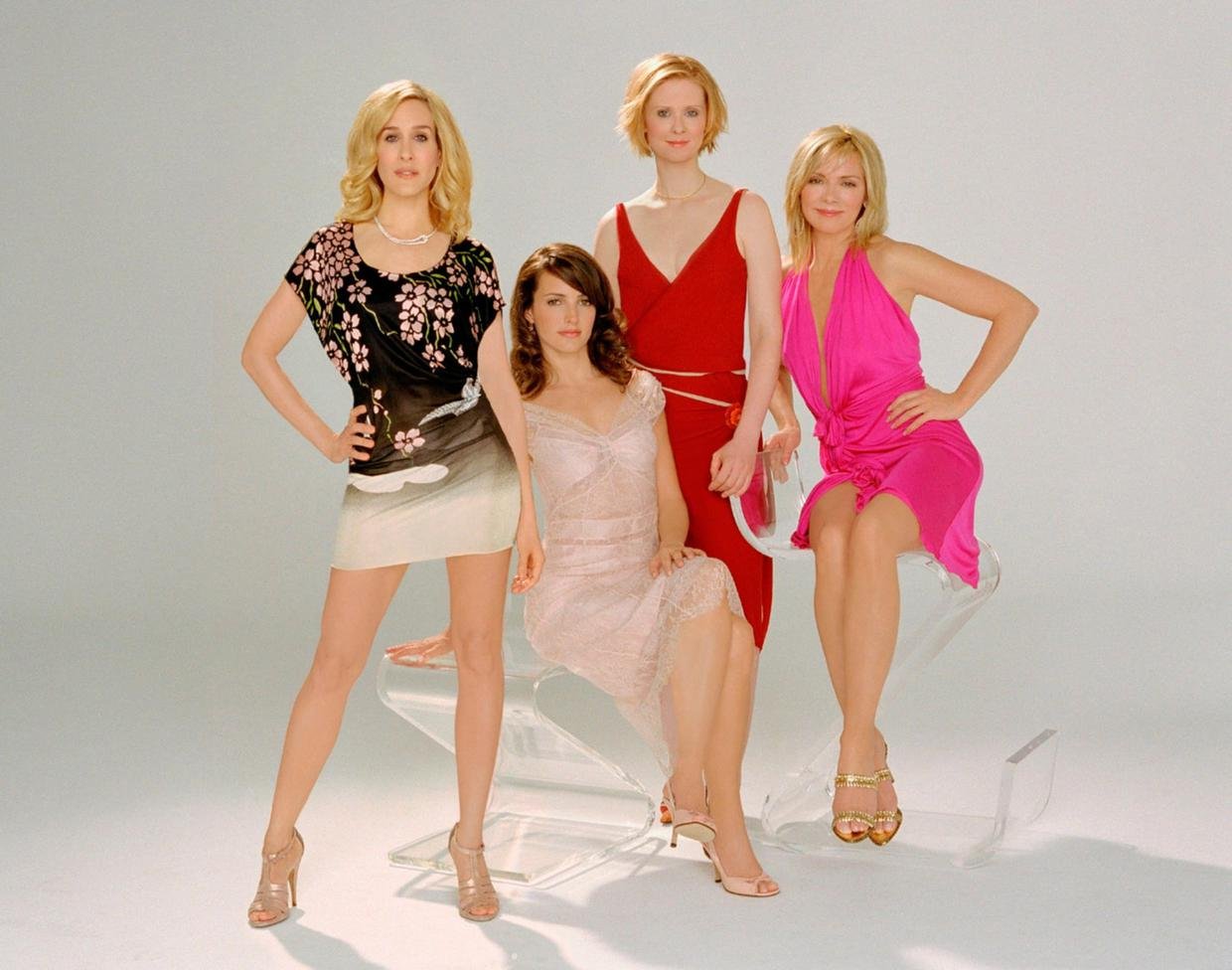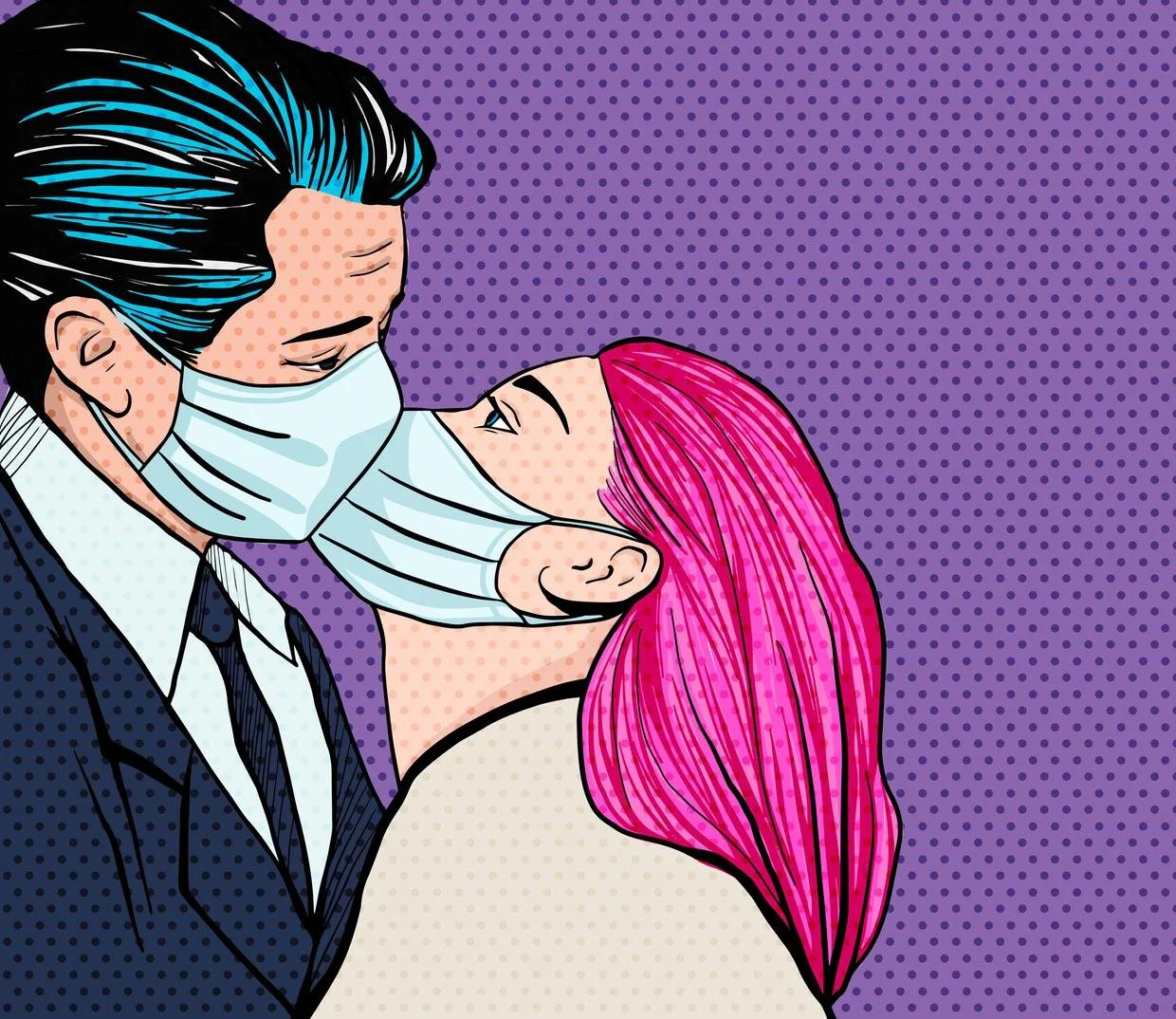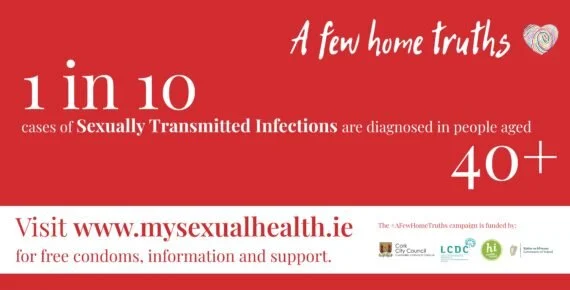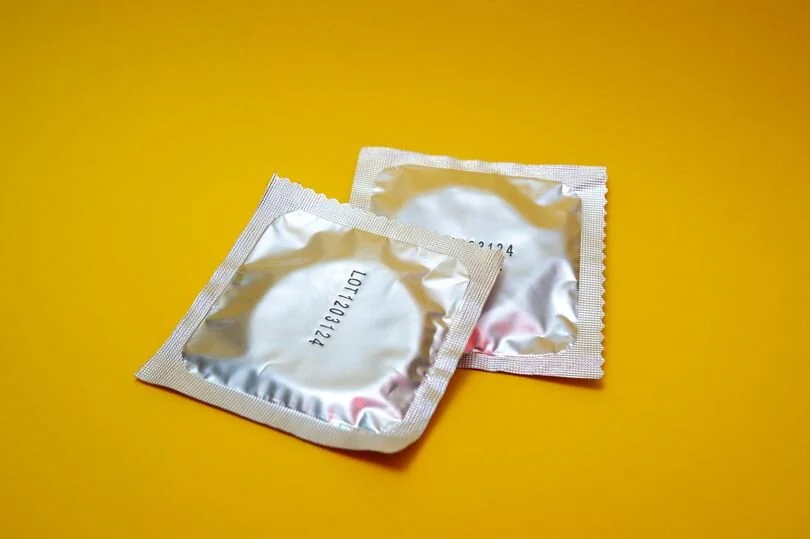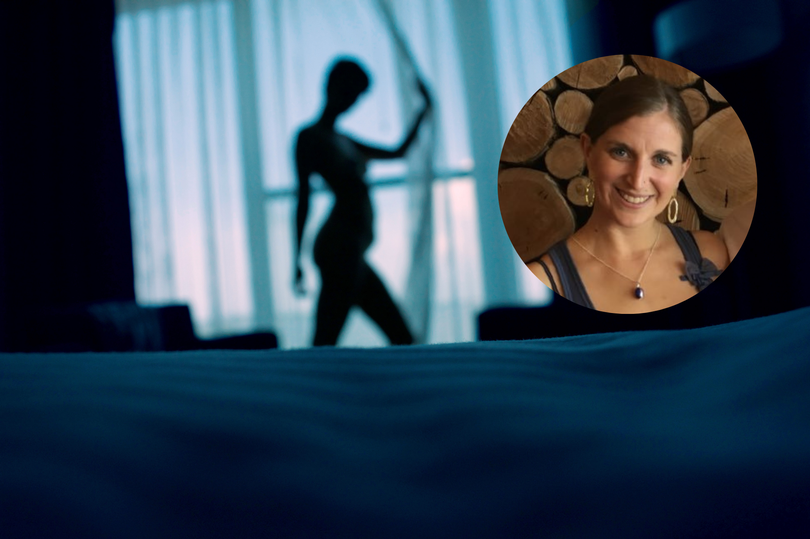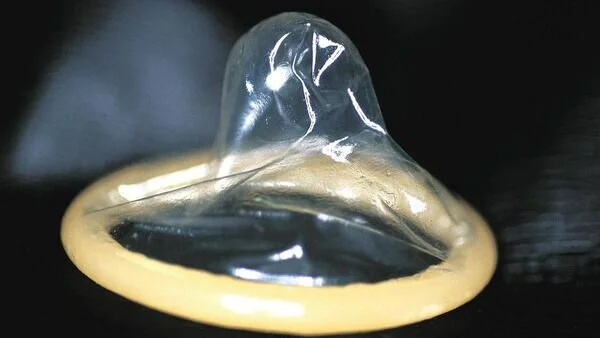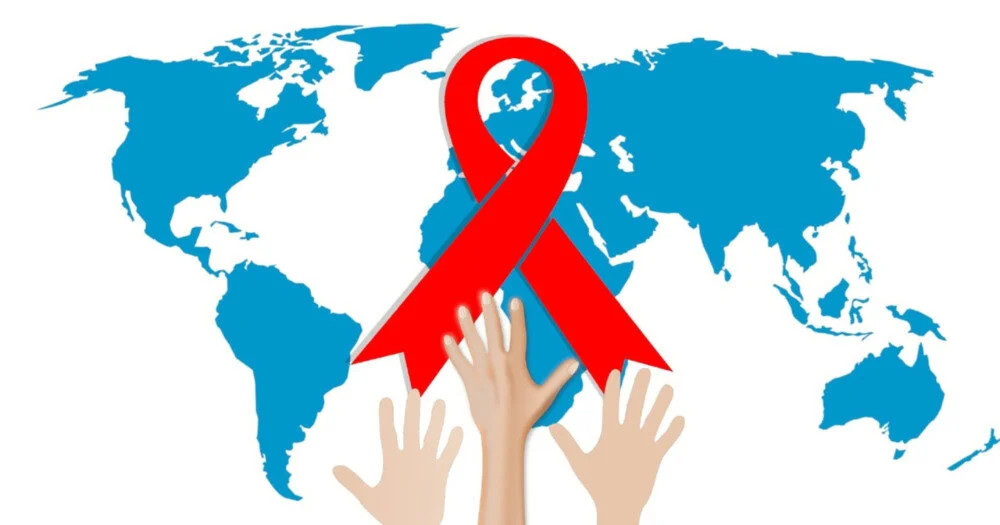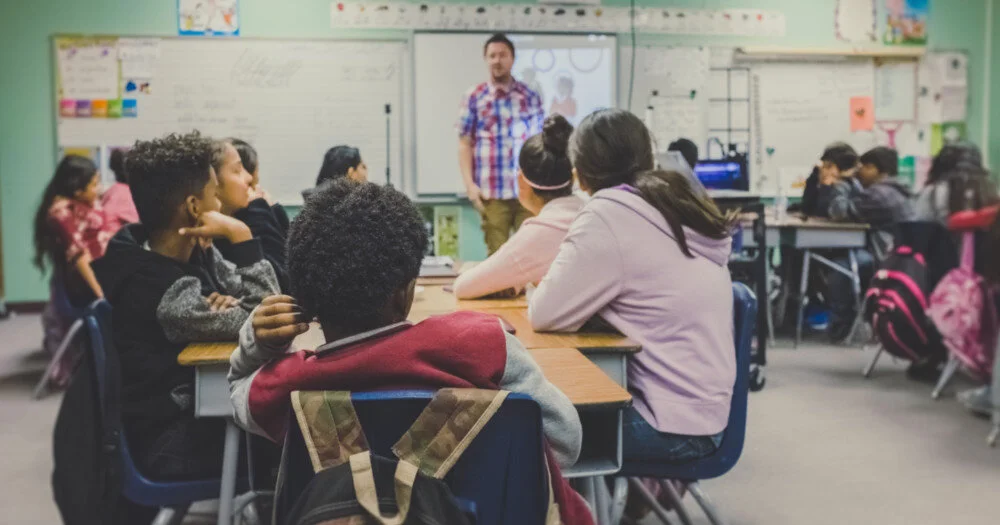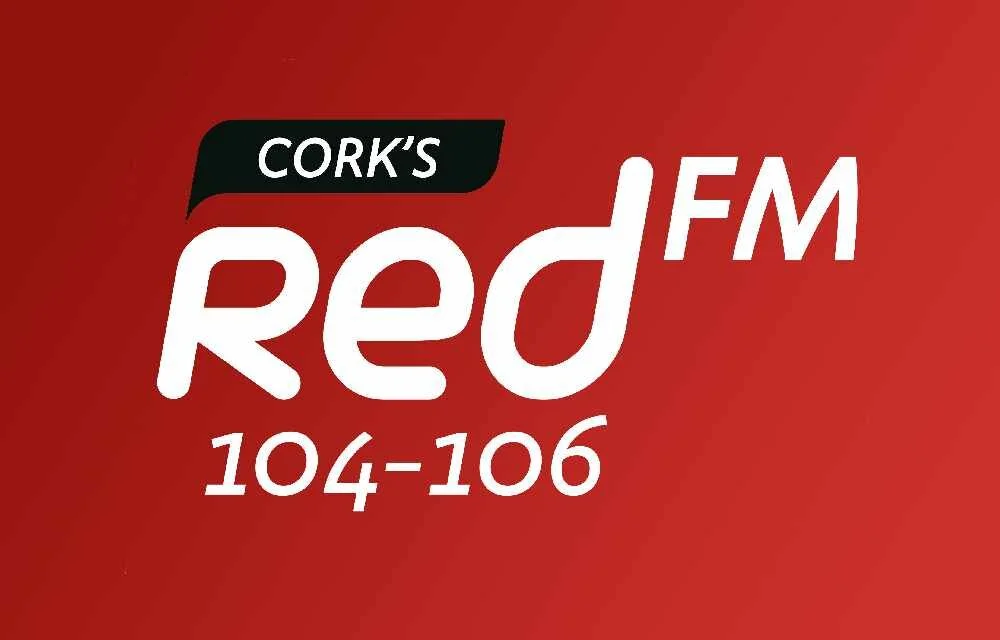RadioKerry.ie: Mobile health unit launched for Cork and Kerry
By Radio Kerry
A mobile health unit has been launched to cover the Cork and Kerry region.
The drugs, alcohol and sexual health (DASH) unit is a joint community initiative between the Sexual Health Centre and the Cork Local and Southern Regional Drug & Alcohol Task Forces.
The mobile health service will travel to any and every part of Cork and Kerry, free of charge, making support, information and interventions available to all.
Executive Directior of the Sexual Health Centre, Dr Martin Davoren, says the aim of the project is to ensure equity of access, and break down barriers people face in accessing services, such as time, location and cost.
The DASH van is available to visit communities and organisations anywhere across the two counties, and for more information, contact the DASH Project Worker, Emily Barrett at 083 013 2250 or dash@sexualhealthcentre.com.
BreakingNews.ie: Travelling drugs, alcohol and sexual health unit launched in Cork and Kerry
A new mobile unit is set to travel around Cork and Kerry to provide rapid HIV testing, condom provision, and drug and alcohol assessments. Photo: PA Images.
OLIVIA KELLEHER
A new mobile unit is set to travel around Cork and Kerry to provide rapid HIV testing, condom provision, drug and alcohol assessments and support from trained health promotion professionals as part of a first of its kind venture in the region.
The Sexual Health Centre in Cork has launched a joint community initiative with Cork Local and Southern Regional Drug & Alcohol Task Forces.
The mobile health service will travel to any and every part of Cork and Kerry — making support, information and interventions available to all.
DASH is available to all sectors of the community, and is free of charge
The ‘DASH’ (Drugs, Alcohol & Sexual Health) unit was launched at St Finbarr’s Campus in Cork city on Friday.
Executive Director of the Sexual Health Centre, Dr Martin Davoren, said that DASH will provide an important link to support for communities across Cork and Kerry.
“The aim of the project is to ensure equity of access. We want to break down the barriers that people face in accessing services — be it time, location or cost. DASH is available to all sectors of the community, and is free of charge.”
'Bridge that gap'
Emily Barrett, DASH project worker said that the unit will bring opportunities for informal interventions in every village and town across the two counties.
“People deserve to get information and support around their health and wellbeing in a friendly and welcoming environment, and DASH will bridge that gap for a lot of people.”
Joe Kirby, co-ordinator of Cork Local Drug & Alcohol Task Force, said that the cross-sectoral approach of the project is central to its development and delivery.
“Drugs, alcohol and sexual health impact everyone at some point in their lives. The client groups of each of our organisations can all benefit from the ease of access and diverse expertise at the helm of the DASH project,” he said.
“Importantly, DASH will be available to members of the wider community, who may not have the opportunity or encouragement to consider their own needs around drugs, alcohol and sexual health until the DASH van arrives in their local area.”
Overlap
The HSE’s head of service for primary care for Cork and Kerry, Priscilla Lynch, said that drugs, alcohol and sexual health services have operated exclusively, even though there is a lot of overlap in the issues that can come up for service users.
“The arrival of DASH marks a turning point in how we think about service provision in these areas across the region. It pools our expertise and brings services to people so that comprehensive, accessible supports are truly available to all.”
The DASH van is available to visit communities and organisations throughout counties Cork and Kerry. For more information, contact Dash at dash@sexualhealthcentre.com.
Echo: Sexual Health Centre offers support for Cork teenagers
Author of Cork Sexual Health Centre’s most recent resource which is shifting the conversation on young peoples’ sexual health, Olivia Teahan speaks to Breda Graham about the importance of such resources during the pandemic.
Tony Power (Social Inclusion Specialist, Cork City Council), launching SHIFT outside Cork City Hall with Olivia Teahan (Author of SHIFT, and Communications & Engagement Lead, the Sexual Health Centre). Photo: Ian Gubbins.
THE Sexual Health Centre in Cork recently launched an inclusive relationships and sexuality education booklet for teens and is also running a series of webinars in relation to sexual health for teenagers.
Sexual Health Information For Teens ( Shift) was launched as a means to help young people, of all sexualities and genders, navigate areas of sexual health such as puberty, sex, relationships and everything in between.
The second webinar in the series based on Shift takes place today at 2pm.
The relationships and consent webinar, hosted by Sexual Health Centre health promotion officer Muire O’Farrell, will explore communication, sexting and pornography.
The booklet was funded by the 2020 dormant accounts funding via the Department of Rural and Community Development under the national LGBTI+ strategy, which seeks to ensure that existing community infrastructure is inclusive and welcoming to the LGBTI+ community.
The resource is inclusive of everyone, regardless of gender or sexuality, and gives each individual information relevant to them about their own sexual health.
Shift author and Sexual Health Centre communications and engagement lead Olivia Teahan highlighted the need to prioritise inclusion and diversity in sex education.
“The idea was to prioritise inclusive sex education and to make sure that it is for everyone and that it does not exclude people, as a lot of sex education does and, unfortunately, it’s not always inclusive of everybody.
“It’s about giving people the opportunity to say, ‘Okay, this is the information that I should be getting’ and that it is okay to be asking questions.
“That’s a priority anyway for the Sexual Health Centre — that young people and everyone can have that space where they can talk about their more intimate concerns, because a lot of people just have not had the opportunity to have a place that they feel is safe to discuss their sexual health and relationships,” she said.
Ms Teahan said that it was particularly important during the pandemic to let young people know that there were still services available for them.
“It’s important to remind people that there are services still running and, just because people might have to physically isolate themselves, they don’t have to be on their own or not get the information they might need,” she said.
“Lockdown heightens online use as well and that’s very relevant in any year for young people — lockdown or no lockdown. We don’t want people to have to go straight to Dr Google for sexual health concerns; you should be able to get that information. There is a lot of misinformation online and I think that’s why it’s extra important to be able to distribute that information to people,” Ms Teahan added.
“Our concern was that, because young people weren’t getting the in-person engagement, that there was that lack of contact and that young people weren’t given the opportunity to check in about different issues that can come up in relation to sexual health and that’s why we thought it was so important to go that extra mile and try to make sure that they have access to those services and that they know that we’re there for them,” Ms Teahan explained.
She said that the Sexual Health Centre had run initiatives to support people seeking information and to support those teaching sex education.
“Before Christmas, the Wise Online programme launched, which was for professionals and anyone delivering sex education, to give them the resources online where, if they are delivering sex education, they feel comfortable doing it and they know we’re there to support them doing it,” she said.
Over the next number of weeks, a webinar series specifically for young people, which is based on the Shift booklet, aims to remind people that the centre is there for them and that they can get in touch with the centre about its various services, despite Covid-19.
She said that the centre had to adjust and adapt its services due to the pandemic, with the move to remote support and counselling services through phone or video calls.
The centre still offers pregnancy testing and HIV testing from Tuesday to Thursday by appointment.
The centre also has a dedicated LGBTI+ sexual health support worker, who deals with various sexual health and relationship issues.
Sexual Health Centre executive director Dr Martin Davoren noted the importance of providing people with factual information around their sexual health, saying that “every young person should be given the opportunity and encouragement to be fully informed about their own sexual health”.
He continued: “This is particularly important when considering the vast amount of misinformation online.
“We are very grateful to Cork City Council and the Department of Rural and Community Development for enabling this important project to come to fruition,” he said.
The Sexual Health Centre has published a number of booklets for Cork’s young people over the years and Shift was developed as a reimagined production of the centre’s Sexual Times booklet.
Shift offers factual information and guidance on healthy relationships, consent, sexual activities, contraception, pregnancy, HIV, sexually transmitted infections (STIs) and more.
Cork City Council social inclusion specialist Tony Power said that it was “fantastic” to see such an engaging and educational resource being made available to Cork’s young people.
“Cork City Council is delighted to support the Sexual Health Centre in making this happen,” he said.
To order a copy or to view the online version of Shift, visit www.sexualhealthcentre.com/shift.
The Sexual Health Centre’s helpline (021 4276676) is open Monday to Friday. The centre, which is located at 16 Peters Street, is open from Tuesday to Thursday for pregnancy testing and HIV testing, by appointment only.
Irish Examiner: Students have their say on overhaul of sex education
Major review on sex and relationships education that heard many different views on how young people should be educated about things like consent, contraception and porn
How students learn about sex and relationships is currently being overhauled, following a major review that heard many different views on how young people should be educated about things like consent, contraception and porn. File picture: Danny Lawson/PA Wire
How students learn about sex and relationships is currently being overhauled, following a major review that heard many different views on how young people should be educated about things like consent, contraception and porn.
The review, carried out by the National Council for Curriculum and Assessment (NCCA) heard from students, parents, teachers and principals, as well as a variety of other interested parties.
They included sexual health centres, religious groups and patrons, including Baptist churches, Catholic interest groups and the Muslim Primary Education Board, as well as groups like Atheist Ireland, Inclusion Ireland, and Rape Crisis Centre, Ireland.
The NCCA found massive differences in the provision of relationship and sexuality education (RSE) across schools in terms of what is being taught, how it is being taught, who teaches it, and how much time is spent on it.
So while there are schools that deliver comprehensive, evidence-based sex-ed programmes, others do not.
Focus on risks and dangers
The RSE review also found that currently education deals “almost exclusively” with the risks and dangers associated with relationships and sexuality, and does not allow for enough discussion of the positive and enjoyable aspects of relationships.
The NCCA review signalled the start of the first major changes to a curriculum which was introduced to schools just as divorce was legalised, and years before the Ryan Report, the marriage equality referendum, and repealing the eighth amendment.
Core areas of the curriculum were also developed before the prevalence of online porn and smartphones, during a time when there were more taboos around contraception.
So how will a new and improved curriculum take these subjects on board?
While the details of the new curriculum are still being worked out, it is expected to move towards a “student centred, inclusive, age and developmentally-appropriate and whole-school” approach.
Public consultation
A draft of the updated junior cycle SPHE specification will be available for public consultation at the start of next year. Work will then begin on reforming the senior cycle courses, followed by primary schools.
Learn more
The importance of relevant and modern sex and relationship education to young people was brought sharply back into focus last week.
New figures from the Central Statistics Office show 20% of detected sexual violence reported in 2019 involved juveniles as both victims and suspected offenders.
Following the publication of those figures, John Church, Irish Society for the Prevention of Cruelty to Children (ISPCC) chief executive, told this newspaper that children are searching for answers online to questions not being addressed in RSE.
Results can be pornographic in nature, meaning its impact must form a central part of discussions on reforming the subject, he believes.
‘Flourish’
Last week, ‘Flourish’, a new programme to be used in Catholic primary schools in line with the current NCCA curriculum for SPHE was developed by the Irish Bishops Conference.
Under various themes, it sets out sex as a "gift from God" which belongs in committed relationships and marriage as a sacrament of commitment.
While children should not be made to feel othered, the Catholic Church’s teaching in relation to “marriage between a man and a woman cannot be omitted".
In an introductory document entitled ‘The vision for RSE in Catholic primary schools’, the programme sets out that RSE must be taught in Catholic schools “with reference to moral decision-making". Each lesson ends with a prayer reflection.
Much has been said and debated in regards to a school's ethos and its influence over the curriculum.
Ethos of schools
The Education Act 1998, which gives students the right to SPHE, also means that school patrons have a legal right to design their programmes in accordance with the ethos of their schools.
This message is repeated across RSE resource material. It means students should never be stopped from learning about aspects of RSE like family planning, sexually transmitted infections and sexual orientation, but an ethos may influence how that content is treated.
In 2019, an Oireachtas education committee recommended that the act be reviewed so that “ethos can no longer be used as a barrier to the effective teaching of the RSE and SPHE curriculum". Proposed legislation to provide objective sex education to students is currently stalled at the third stage in the Dáil.
The bill introduced by Solidarity-People Before Profit TD Paul Murphy would 'guarantee the right of students to receive factual and objective relationships and sexuality education without regard to the characteristic spirit of the school'. Picture: Gareth Chaney/Collins
If passed, the bill introduced by Solidarity-People Before Profit TD Paul Murphy would “guarantee the right of students to receive factual and objective relationships and sexuality education without regard to the characteristic spirit of the school.”
Even the current Government has pledged to make the appropriate legislative changes “if necessary”, when it comes to an inclusive and age-appropriate RSE and SPHE curricula, including an inclusive programme on LGBTI+ relationships.
However, the NCCA found “two strongly divergent” views on the subject – one which saw ethos as an aid to assisting schools with RSE, and a contesting view that it hindered fully comprehensive provision of RSE.
LGBTI+ students
'Stand up' week is run yearly by BeLonG To, which supports LGBTI+ young people. File picture
Moninne Griffith, the chief executive of BeLonG To, which supports LGBTI+ young people, believes leadership within a school is an important factor.
“I think it's more down to the leadership in the school, rather than the ethos," she said. "The reality is that we find that in some schools, they may have a Catholic ethos, but they teach the students what's the law of the land. They may say something like ‘well, this is the teaching of the Catholic Church, the law of the land is that LGBT people are equal citizens and they can get married’.
I do not want to tar all schools with a religious ethos with the same brush. Some are really excellent and really engaged in relation to making sure that the LGBT students in their school feel visible, valued and included, and then some aren’t.
“We run ‘Stand Up’ week every year with schools all over the country and there are amazing schools that are Catholic or Protestant who engage with us. What I've heard them articulate is that they say their values as a Christian school around loving one another and respect and equality empower them and support them to do work around LGBT inclusion.”
Inclusive RSE
Inclusive RSE is really important for all students, she added. “The knock-on effects for LGBT students means not feeling welcome in school, being much more likely to miss school or to drop out. It's important, not just in RSE but right across the curriculum, that LGBT young people see their lives and their experiences, reflected back to them. The reality is what we hear from young people is that it's rarely covered.
“From talking to teachers, I think that sometimes it's an embarrassment or lack of confidence, or a lack of feeling capable.”
Teachers may be asked to take on teaching SPHE and RSE without any additional training, she added.
“So we've heard from a lot of people that it's not great, whether you're LGBT or not, in terms of what it covers and how relevant it is for young people today.”
It’s important that RSE is inclusive, according to Phil Corcoran, senior health promotion officer with the Sexual Health Centre, Cork, "so that all young people that the programme is being delivered to can see themselves within that".
But a major hurdle can be discomfort amongst the educators tasked with delivering RSE to students.
“It can be difficult to teach geography in one class, and then switch to these very personal issues," he said.
"We would have delivered a school programme for many, many years but there was a decision made at Government level that the teachers were best-placed to deliver these programmes, for a number of reasons, one being that all young people would have access to them as part of their regular schooling.
"But I suppose the problem with that is that a lot of the programmes being rolled out in schools are quite out of date. When we pulled our schools programme, we had lots of calls from teachers who were concerned that they weren't equipped to deliver these programmes themselves.”
Still to this day, he receives calls from teachers, he added.
“I suppose the feeling from teachers is that having somebody from outside of the school gives the students a greater comfort level.”
To help youth workers, teachers or parents with RSE, the Sexual Health Centre developed a programme called ‘WISE (What; Information; Support; Engagement and Education) facilitation, available on its website.
“Any professional working with young people can log on, the programme itself takes about three hours to do and it covers a range of subjects. It looks at STIs, there is a specific section on HIV, problems with sex, there's a section on sexual assault and consent. There's a section on pregnancy, contraception, gender, and sexuality.”
In terms of an approach, WISE facilitation considers RSE not just in terms of biology.
“There's a whole lot more to that in terms of consent, and how somebody relates to their own sexuality. There's a lot more to it than just biology and the physical act.”
What students want from RSE
Students want a more realistic approach to learning about sex and relationships, one that mirrors their real-life experiences.
That’s according to Matthew Ryan, a sixth year student from Cork, and the welfare officer of the Irish Second-Level Students Union (ISSU).
More than one in three older students surveyed recently by the ISSU said they had received no relationship and sexuality education (RSE) so far during their senior cycle of study.
Six out of 10 students said they received RSE only at a “minimum level” throughout fifth and sixth years, in some cases limited to a single talk or class, or a “surface-level” discussion.
Almost half of the students surveyed described the RSE they’ve received so far as “lacking” or “very lacking”.
“RSE in this country has always been lacking,” Matthew said.
“It's something that you'd be lucky if you even covered it in the biology course, as in the physical anatomy. It’s been very slow to progress and it's something that's becoming even more and more relevant.
What's your view on this issue?
You can tell us here
“We've seen recently reports in the news of how cases of young sexual assault are rising. We aren’t getting the education we need in relation to online safety. Our RSE courses are fine. They'll give you the bare minimum of what you would need to understand it.
“But they don't give students anything about any other side of a sexual relationship, like the emotional side of it, the pleasure side of it, or anything like that.
"It just gives students the bare minimum, if they're even given it in the odd religion class or the odd wellbeing class.”
Teachers also aren’t being supported enough in terms of training for how to teach RSE, he added. “Until the teachers are supported, it's very hard to support the students.”
Realistic approach
Students need a more holistic approach to RSE, but they also need a more realistic approach too.
If you look at the curriculum, it has things like getting students to do role plays, where you're pretending you're at a party. But no student really is going to engage with those things.
“They're just not relevant to this time, and it's not how students interact and behave in the real world. We're being taught this one thing inside the classroom as if it's just a perfect bubble for an experiment but that's not what real life is like at all for any student. We're really not being given the real-life skills that are needed. We're just given how it works, basically.”
He says students are therefore learning it themselves, and they're not learning it in a safe environment.
"They're learning it online and then they're getting very unrealistic views of what sex is and what RSE is. Then that can obviously be quite damaging going on, especially into third-level education.
“Every year when sixth years graduate, that's another year moving into higher education or whatever route they go in which they just haven't had the education needed. RSE will be most vital when you're starting college. If you don't have that education, you're at a huge disadvantage. It just leaves students really grasping at straws.”
The ISSU does hear from students directly every now and then with concerns about their RSE instructions, he added.
“There was one email we got in about a student and the teacher basically had put on a video about abortions that was completely incorrect.”
Students want their input into RSE reforms reflected in the new curriculum. The ISSU is working with the NCCA, Matthew added.
“We're not looking to reinvent the wheel with RSE and we're not looking to have a PhD in sexuality and relationships coming out.
Students just need a realistic and open approach that isn't hiding behind outdated terms and isn't hiding behind old language.
“We need a constantly evolving system, because by the time I'm out of school, there'll be a whole new set of terminology and everything with the next generation. We need a system that reflects that, a system that is adaptable to that. We don't need an ‘amazing, big, fancy curriculum’, we just need something that gives students realistic information about the real world, and about how they can best protect themselves.”
Saoirse Exton.
Saoirse Exton is a transition year student in Limerick city, and the ISSU equality officer.
“From my own experience, sex education has been atrocious,” she said.
It’s basically like the teacher going red in the face, as he pointed out the different anatomical parts of sexual organs. And that was it. That was sex education.
"From the other students that I’ve talked to, it really isn’t good. It doesn’t talk about consent. It doesn’t talk about contraception, it doesn’t talk about options if you’ve gone through a rape crisis. It doesn’t talk about pleasure, it doesn’t talk about homosexuality.
“In RSE at the moment, when it comes to talking about LGBT issues it’s so binary. It’s like ‘sometimes men like men, and sometimes women like women’ and that’s the extent of it.
“That's really disappointing because it's such a wide spectrum, and it's so important to talk about. We also need to talk about contraception, we need to talk about period poverty.
"Obviously, there's some things we can't really talk about in a school environment. But I think we can about most things. It's really important when it comes to safety, we need to talk about sexually transmitted diseases and the options that people have if they need to get tested. We need to break down those stigmas.”
Embarrassment
There is still embarrassment when it comes to talking about these subjects, she added.
“There is always going to be a little bit of embarrassment because we just don't really talk about sex at all. I think, despite that kind of initial embarrassment, it's really important to normalise it and to destigmatise talking about it.”
Students may have taken part in Active* Consent workshops, a programme by NUI Galway for university students, second-level students and youth clubs, but a lot of students who haven’t still really understand the concept, Saoirse believes.
“It’s really important to remember that if we don’t have better RSE education, it could spell a lot of potential health problems or problems in relationships. By ensuring that we have this education, it will make a safer school environment, where hopefully everyone will feel more comfortable. If the education system actively acknowledges non binary, or non-gender-conforming students, that's incredible for those students.
Heteronormative
“With RSE at the moment you see the very kind of binary, very straight way of looking at things, and very heteronormative as well. It's just disappointing because there's so much more to identity, to relationships and to sexual health.”
She worries about students who do not get information from their school, or from their parents.
“My parents were very open with me when it came to sexual health and all of that. But I don't know how most people learn about it. Because again, if you don't have it at school, and if there's some stigma that parents have when talking to their children about this, I mean, where does that information come from? “If it comes from experiences, and most likely bad experiences, that's really not the way to go.”
What is actually covered by RSE?
Many of us will share the same memories of some embarrassment in the room during our first introduction to sex education, probably none more obvious than that of the teacher’s.
But who among us could stand at the top of a classroom and talk to teenagers about deeply personal subjects without any formal qualification or accreditation?
Relationship and Sexuality Education (RSE) is delivered as part of Social Personal and Health Education (SPHE), the only subject at post-primary level currently that can be taught without a qualification from the Teaching Council.
The core RSE curriculum itself, now under review, is more than 22 years old.
As it’s not meant to be “prescriptive” and is often supplemented with different resources, it can be difficult to get a uniform picture of how the subject is covered.
So what is, and isn’t, covered in schools currently?
At the turn of the millennium, RSE became a mandatory component of the new primary school curriculum as part of SPHE. Each school is also required to have an RSE policy in place.
At post-primary, it’s also required to be taught as an integral component of SPHE, and junior cycle students are entitled to one class per week of SPHE.
For senior classes at second-level, SPHE is not mandatory. However, schools are still required to teach students RSE.
Schools are required to teach all aspects of the RSE programme, including family planning, sexually transmitted infections and sexual orientation. Ethos may influence how that content is treated.
To what extent can vary. For example, a spokesman for Educate Together said it promotes a model of education with young people at its centre.
“In line with this, Educate Together considers that approaches to RSE should be grounded in the rights and needs of young people.”
Free from religion
RSE is delivered free from any aspect of religion, and work is done on celebrating and normalising different family types.
“Educate Together has always encouraged schools to address, rather than avoid, any areas that might be considered difficult or controversial in relation to RSE.”
There are 28 Protestant post-primary schools, and more than 190 primary schools, under many different patrons. As such, there isn’t a singular approach. But, in general, schools are advised to stick to the NCCA resources on the RSE curriculum.
In general, schools also do not follow supplementary programmes, or bring in external providers.
ETBs are the patrons of 27 community national schools and 245 post-primary Schools. RSE is not taught through any particular religious or belief lens, a spokesman said.
“The ETB position as communicated to the boards of managements of our schools is that RSE is about relationships, emotions and wellbeing. This holistic approach considers not only the sexual health of young people but does so by informing them in a holistic, balanced and factual way.”
For primary schools, the first RSE materials were published by the Department of Education in the late 1990s. Suggested approaches to learning include art, group work, games, videos or educational dramas.
Lessons for junior and senior infant classes include themes like ‘This Is Me’ and ‘These Are My Friends’. Themes for lessons for first and second class students include ‘Keeping Safe’, ‘Showing my Feelings’ and ‘How My Body Works’.
Puberty is first discussed in the lesson resources for third and fourth class students, under the heading ‘Growing Up’ which discusses periods, mood changes, body hair, and skin and voice changes.
Sexual intercourse is discussed for the first time in the department resources for fifth and sixth class students in the context of "conception".
It is described as “a special experience for the man and woman and ideally happens in the context of a committed loving relationship as in marriage.”
These resources do not specifically discuss how RSE should be taught for students with special educational needs. However, the National Council for Special Education (NCSE) runs tailored courses for teachers.
The NCCA also has guidelines for teachers of students with general learning disabilities for teaching SPHE.
While the department’s teacher manuals were published in the '90s, primary schools may also be following the Stay Safe programme, which teaches students how to respond to abusive situations, or Walk Tall, both of which were published more recently.
The Busy Bodies booklet and video from www.healthpromotion.ie is also popular with schools but the booklet stresses itself that it is not to be considered a full RSE programme.
This illustrated booklet discusses puberty, gender identity, healthy relationships, and sexual orientation.
The original Department of Education teaching resources are not meant to be “prescriptive” but instead “provide a menu of options for classroom lessons from which teachers can choose in accordance with their school policy on RSE.”
This allows schools to choose RSE materials from other alternative sources, or to “supplement and complement” the Department of Education materials.
More recently, the NCCA has published a toolkit with resources it recommends while work continues on curriculum reviews.
At post-primary level, core materials for RSE again were first published in the late '90s. Again, each school is required to have a policy on RSE.
The older teaching resources state that the values in an RSE programme should be consistent with the “core values and ethos of the school”. Resource materials should also reflect these values.
The materials were prepared in line with a number of value statements, which include:
Making decisions about sexual behaviour is not simply a private and personal matter – there are also social and community implications;
Sexual intercourse is an expression of intimacy and relationship – it is not appropriate to casual encounters;
The commitment of marriage is a positive context for sexual intercourse.
Schools who wish to supplement or amend materials in order to reflect particular values set out in school policy are free to do so.
“For example, a school may wish to emphasise that sexuality is a gift from God, and therefore would include additional resource material to reflect this dimension. Another school might wish to highlight rights and responsibilities and would amend the resource materials accordingly.”
At junior level, RSE deals with topics like human reproduction, “boy/girl relationships”, and pregnancy.
At senior level, lessons include human sexuality, responsible parenthood, and the “implications” of sexual activity.
Further resources also in use by schools include TRUST (Teaching relationships, understanding sexuality teaching for senior cycle), and B4udecide.
If a school would like to address consent, the Dublin Rape Crisis Centre has two programmes promoted by the NCCA: BodyRight and Let’s Get Real.
Supporting LGBT students
The NCCA also promotes a number of resources to specifically discuss supporting LGBT students, gender identity, pornography and sexual wellbeing.
Schools are also free to bring in external providers if they so wish. This could include consent workshops, or talks from NGOs.
The immediate focus of the NCCA development groups has been to create support materials for teachers as part of an interim guidance toolkit while a new curriculum remains in development.
“The toolkit's purpose is to support effective teaching and learning of SPHE/RSE linked to the current curriculum.”
Further sections of the toolkit will be added overing the coming weeks and months. It includes resources on preparing to teach RSE, like how to respond to challenging discussions, topics and questions, and working with parents.
Is bystander training the way forward for RSE?
Could bystander training be used as part of relationship and sexuality education (RSE) to teach teenagers how to stop accepting and perpetrating “normalised” sexual harassment and violence?
The University College Cork (UCC) Bystander Intervention programme, developed by Professor Louise Crowley, has been working with students to build a zero-tolerance approach to such behaviours on college campuses.
Now, she plans to further develop the programme for second-level students. It could even be adapted for primary schools in an age-appropriate way.
From working with young adults and teenagers, Prof Crowley said it has become obvious to her they have come to normalise things such as being groped in a nightclub or receiving sexually explicit pictures on their phones.
All this type of degradation and day-to-day hostility that exists, it’s almost part of everyday living for them.”
We know that sexual harassment and violence is occurring during people's teenage years, she added.
Six out of 10 first-year college students responded to a 2020 survey indicating they experienced sexual hostility or harassment in their first year of study.
Almost 20% of reported sexual assaults in 2019 involved a victim and suspected offender under the age of 18, according to recent figures released by the CSO.
“So it's essential that these conversations happen at second level,” she said.
Bystander intervention is about empowering students to consider and act on their shared responsibilities.
It’s about talking to the students and giving the students information to better understand that, actually, this is not normal behaviour, it is sexual harassment, and it doesn't have to be tolerated.
“It's about educating them about what sexual harassment and hostility looks like and then empowering them to do something about it, instilling in them a sense of social responsibility. It’s about creating a feeling of ‘this is our campus, this is our study experience, and it doesn't have to be like this for anybody'.
"So even though you may be a third party, or a bystander, instilling in them a sense of responsibility that they do have a role to play. Because unless we stand up and identify and respond to troublesome behaviour, even though we’re not directly involved, we’re contributing to it. It’s almost a consensus that it’s acceptable.”
In 2019, Prof Crowley hosted a workshop for teachers interested in developing a “2020 version” of sex education for their students.
“In a way that would facilitate students to recognise this type of sexual harassment is not acceptable, and that they don't have to stand for what they see amongst their peers, or what they themselves experienced, or what they themselves might perpetrate and are guilty of.
"It’s about opening their eyes to the impact of this kind of behaviour and then letting them know that they have the capacity to do something about it, to change the narrative and to develop a new normal.
“The normal that they should have, that actually you’re not getting harassed or catcalled when you walk on the street or receiving unwanted messages on your phone or being pressured into sexual behaviour and sexual relationships amongst your peers.”
Prof Crowley worked directly with seven schools in Cork, developing four 40-minute sessions, involving fictional scenarios that relate to the lives of teenagers.
“Scenarios like ‘Johnny and Mary are in a relationship, and Johnny keeps checking Mary’s phone, and when she goes out she has to send him photographs of where she is and who she is with’.
"Students are then asked to discuss if this behaviour is troublesome, and why, how they would react, what they could say and when. It’s about getting them talking around scenarios.”
The training does not point fingers at anyone.
“It’s very neutral in that way, in that you're speaking to the best part of everybody, showing them that you can be the person who makes a difference. There will be perpetrators in the room, even in TY, definitely at third level, and there will be people who have survived sexual abuse. But you’re not pigeonholing anybody. You are speaking to the part of them that can make a difference.
"Some of the feedback from the second-level teachers was that the students really appreciated it because, for the first time, there was an acknowledgement by the teachers using this material of the world they actually live in.
“The message I got from that was that a lot of what is traditionally delivered is one talk, not interactive, which I think is crucial. You need to let the students own the space and ask questions.”
Traditionally, RSE can also be ‘old-school’ for want of a better word, she added.
“We included things like social media interactions, Snapchat, the abuse on Snapchat, the dangers of social media for things like stalking or sexual harassment. In presenting the material within their own worlds, they really were grateful for the opportunity in a very safe space, to reflect and to discuss with their peers and to hear about their peers’ experiences.”
With the help of teachers, Prof Crowley hopes to begin developing a new version of the bystander programme for second-level this summer, in the form of six or seven 10-minute videos online and an instruction manual for teachers.
“I'm very conscious of the need for second-level, relevant, modern material, to allow students to really consider this, to consider it themselves and to not be told. This is really important, that we’re not standing there telling teenagers how to live their lives.”
Irish Examiner: 33% fall in HIV and STI diagnoses, HSE figures show
Health experts have said lockdown restrictions affects on socialising have reduced the spread of STDs. Picture: iStock
CIARÁN SUNDERLAND
Over 1,000 fewer people have been diagnosed with HIV or a sexually transmitted infection (STI) this year, than at the same time in 2020.
The figure for the first 11 weeks of this year is 2,116 - down over a third from the same period last year when the HSE recorded 3,300 HIV or STI diagnoses.
Among the 2,116 recorded cases in 2021, eight people under 14 have tested positive in 2021, and 181 aged between 15 and 19.
Martin Davoren, the executive director of the Sexual Health Centre in Cork said the drop in diagnoses can be explained by the introduction of lockdown restrictions to reduce the spread of Covid-19.
Speaking to Newstalk, he said the drastic reduction of socialising along with 5km travel limits have affected the rates of STI and HIV infections in the country.
"In 2020 we were socialising, we were out and about, the pandemic had yet to hit our shores. And so people were active both in society, but also more so within their sexual lives.
"For 2021 we're in a very different landscape right now, we're in the 5k limit, we're not meeting people outside of our households. And so, levels of sexually transmitted infections may be less," he said.
For Niki Martire, director of SpunOut.ie, the lockdowns are an obvious source for the decrease but she also has pointed to the reduced public health services available as a result of the pandemic.
"I mean the obvious one is of course that we have been in a prolonged period of being asked to either be in lockdown or to be socially distant, so that's one kind of obvious thing to point to, people might say that is reasonable.
"But of course we have also seen services that are no longer available, services that are shut down or are at limited capacity or have had to re-prioritise their attentions in other areas," said Ms Martire.
Meanwhile, screening and testing delays to diagnose cancers, lengthening waiting lists, and increasing exhaustion amongst staff and patients are being flagged as just some of the impacts the pandemic is having on cancer services.
Cancer doctors want urgent action to address the major issues that services are encountering and which are causing huge anxiety and anguish for patients.
GCN: Sexual Health Centre Cork launches SHIFT (Sexual Health Information for Teens)
This inclusive new resource will help Irish teens navigate topics such as sex, puberty and relationships.
BY ROSS HUNTER
Image: Ian Gubbins
The Sexual Health Centre in Cork launched its SHIFT (Sexual Health Information for Teens) booklet on Tuesday the 23rd of March in response to the need for inclusive Relationships and Sexuality Education for Irish teenagers.
The booklet was launched with the help of the Cork County Council’s Social Inclusion Specialist, Tony Power, who praised the availability of such a resource. “It’s fantastic to see such engaging, educational resources being made available to Cork’s young people. Cork City Council is delighted to support the Sexual Health Centre in making this happen”.
The SHIFT booklet was developed as a reimagined production of a past sexual health resource by the centre, this time ensuring that the booklet was as inclusive of all LGBTQ+ people as possible. The resource explores themes of sexual health that affect young people of all sexualities, genders and backgrounds. Such areas include guidance on healthy relationships, pregnancy, contraception, HIV and Sexually Transmitted Infections.
The Author of the SHIFT booklet, Olivia Teahan, emphasised the importance of prioritising inclusion and diversity when developing sexual health resources for young people. “Inclusive sex education not only contributes to positive sexual health outcomes and healthy decision-making for all – but it also encourages understanding among peers of different genders and sexualities.”
“At the Sexual Health Centre, we pride ourselves on creating a non-biased and inclusive space for everybody,” Teahan continued. “We want to empower young people in Cork to discuss their most intimate concerns in a safe environment, if and when they need to.
“To date, many Irish people – young and old – have not had the opportunity. We need to shift the conversation away from shame and judgement, and towards openness and acceptance.”
The executive director of the Sexual Health Centre in Cork, Dr Martin Davoren highlighted the importance of providing young people with accurate information regarding sexual health and guidance on how to safely navigate this aspect of their lives. “Every young person should be given the opportunity and encouragement to be fully informed about their sexual health. This is particularly important when considering the vast amount of misinformation online”.
Far from the Sexual Health Centre’s first initiative, the Centre has introduced a range of resources in past years such as a peer-led LGBTQ+ sexual health advisory service and Ireland’s first community sexual health hub. If you want to order a hard copy of the SHIFT booklet or to view the online version, visit the Sexual Health Centre’s website here.
The Centre will also be hosting a series of webinars for young people in the months to come. Information about these webinars will be made available on the Sexual Health Centre’s website.
Irish Examiner: Overhaul Ireland's sex education or face an addiction epidemic
"Ireland is maturing when it comes to how we think and talk about sex. Whether it is our curriculum in school, or our open attitude towards sex, Ireland is turning its back on its moralistic past. In doing so, we will have to address the shame and sexual trauma left behind after years of dysfunction. This process should, and must, include a conversation around consent, education, and, very importantly, sex addiction. And I believe we are ready to have that conversation," says senator Lynn Ruane, a long-time community addiction worker and ex-president of Trinity College Dublin’s Student Union.
Compulsive sexual behaviour is thriving in Ireland during the Covid-19 pandemic as the conditions in lockdown are ripe for addiction to escalate, according to experts dealing with people seeking assistance to overcome sex addiction. In fact, specialist services cannot keep up with the demand.
Lynn Ruane: "Ireland is turning its back on its moralistic past. In doing so, we will have to address the shame and sexual trauma left behind after years of dysfunction. This process should, and must, include a conversation around consent, education, and, very importantly, sex addiction. And I believe we are ready to have that conversation."
Many leading authorities believe there a sex addiction epidemic secretly coming of age in Ireland. Sex addiction affects both men and women across all strata of society but Irish youth, teenagers especially, flung into a global sexual revolution for which they are thoroughly unprepared, are most vulnerable.
Ms Ruane is seeking a radical change to Ireland’s sex education curriculum as a significant move in the right direction. Lynn advocates that as a society we have a responsibility to educate people, especially young people, but society must first develop its own balanced attitude to the issue.
In a country evolving from extreme sexual trauma, abuse, and repression, there are serious concerns that an Irish society making policy from unexamined shame-based views on sex will only create more of the same — exacerbating the very problem it’s attempting to address. Therefore, Lynn is firstly calling to open a national dialogue on Ireland’s sexual issues.
Donal Clifford, one of the country’s few psychotherapists specifically trained in treating sex addiction, says, "sex addiction is a rapidly growing problem in Irish society today, evident in the numbers presenting to therapists for help. This is mainly due to accessibility to the internet and social media, where people have free, anonymous, 24-hour access to sexual partners and activities without limits".
Learn more
Donal Clifford: "Sex addiction is a rapidly growing problem in Irish society today, evident in the numbers presenting to therapists for help."
Donal is the founder of the organisation, SALT Sex and Love Therapy, based in Cork. The group supports people to change their out-of-control and damaging sexual behaviour. Yet, despite recently expanding its capacity fivefold, SALT cannot meet the vast numbers asking for help.
A recovered alcoholic and drug addict with more than 10 years’ experience as an addiction counsellor, Donal now focuses solely on helping those suffering from compulsive behaviours around love and sex.
"The United States has been working with people presenting with sex addiction for half a century, and the UK have designated centres for 15 years. Yet, here in Ireland, we have almost no resources directed at the issue," he says.
"In Cork alone in the past five years, I have 72 clients who have presented with what they describe as sex addiction. Many more are seeking help but there is nowhere for them to go. I believe these small few with the courage to come forward represent only a tiny percentage of people suffering with this addiction."
Experts believe the Covid-19 pandemic only intensifies this situation by fostering the conditions in which compulsive sexual behaviour usually thrives.The stress of forced isolation implemented during the lockdowns channelled millions of people towards increased online connections, hook-up sites, and pornography use, while simultaneously cutting off those most at risk from the resources they need to support their mental health: healthy connections, therapy, treatment centres, aftercare programmes, and 12-step fellowships.The extent of the effects of the pandemic on sex addiction will only become apparent over the coming years.
However, some experts remain cautious about labelling compulsive or damaging sexual behaviour as addiction. Sex therapist and Ireland's only clinical sexologist Emily Power Smith is a champion of sex positivity and on a mission to make it safe and easy for Irish people to talk about sexuality. She is rallying against sex addiction as a diagnosis.
"Choosing to focus Irish attention on a label that incites fear and shame is the total opposite of what is needed. In order to create positive change in our society, we need to become educated and confident, not more scared and disempowered," says Emily.
"Sex addiction [as a label] doesn't allow us to distinguish between consensual and non-consensual acts that might be out of control or problematic. It allows untrained practitioners to diagnose and treat people however they want, because we are not educated enough to question those practitioners. Let's have more sex positive education and less diagnosing ‘sex addiction’ because they don't approve of masturbating to porn."
While many experts on the frontlines predict that sex addiction and its consequences — unplanned pregnancies, STIs, mental health problems, eating disorders, alcohol and drug abuse, and increased suicide figures — will soon rival the devastating effects of Ireland’s alcohol, drug, and gambling crises, others claim that this issue, left untreated, can lead to criminal sex offences: sexual assault and abuse, paedophilia, and rape.
Emily Power Smith: Rallying against sex addiction as a diagnosis.
A serious question shackling the sex addiction debate is whether behaviour such as compulsively watching pornography can be proven as causative of criminal behaviour. An answer to this could be the decisive element to prompt the State to take a more active role in addressing our dated and ineffective sex education curriculum as well as establishing the essential treatment facilities.
Dr. Patrick Randall, clinical and forensic psychologist and founder of FPS Forensic Psychological Services has over 30 years’ experience assessing and treating both adult and adolescent sex offenders, as well as providing supervision and consultation to clinicians working with this client group.
As Ireland’s leading authority on criminal sexual behaviour, Patrick’s decades of direct exposure to the most terrifying sexual trends developing in our society have left him in no doubt of the controversial opinion that obsessive porn use is a direct cause of criminal sexual behaviour.
‘The compulsive use of pornography has resulted in criminal behaviour as consumers become satiated and need more graphic and disturbing scenarios to maintain their arousal. For some, this plunge into depravity continues unabated until halted by the knock of the Gardai on their door,’ Patrick says.
Nevertheless, all sides absolutely agree Ireland drastically needs to overhaul its sex education and sexual health policy. It is also agreed this is a health and social issue, not a moral one. Sex-related problems thrive in secrecy and shame, and an open, non-judgmental national dialogue must be the first step before effective treatment can be put in place, otherwise the problem will only continue to fester and grow. People on every side make excellent points, but the stakes are enormous - the sexual health of generations of Irish people to come.
If you are suffering from sex-related issues, please seek advice at your local HSE Sexual Health Centre.
Belfast Telegraph: Let's talk about Sex (and the City)
It was the landmark TV show that changed how women talked about sex and desire onscreen but with it set to return, Meadhbh McGrath asks whether the forthcoming portrayal of the fifty-something women will be as honest as before.
When Sex and the City arrived on our screens in 1998, sex was already on the brain for much of the audience. The Bill Clinton/Monica Lewinsky scandal was dominating the airwaves, and talk of incriminating stains, wayward cigars and phone sex was ubiquitous in media coverage and water-cooler conversations around the world.
Yet while Lewinsky was cast as a laughingstock and a "tramp" - a popular perception that has since undergone mass re-evaluation post-#MeToo - Sex and the City (SATC) took a very different view of female sexuality.
Independent.ie: Sex in the pandemic
Sex in the pandemic: ‘A lot of people are feeling pressurised to meet with people, get on with it and have sex in a car. They’re told by others on apps not to be such a goody-two-shoes...’
Mention to anyone that you are writing about Irish people’s sex lives during the Covid-19 pandemic, and the jokes aren’t far behind. “That’ll be a short piece!” notes one colleague. “What’s that again?” asks a friend.
They might have a point. Historically, people’s sex and dating lives have often been changed beyond recognition by a pandemic, especially when measures to curb human interaction have been implemented. Kissing Is Barred While Influenza Is Lurking About, reads one headline from a US paper in 1918. Yet according to historian Dr Kate Lister, during the Black Death, people “rushed headlong into lust”. During the Great Plague of London in 1665, she notes that “it was also widely believed that you couldn’t contract the plague if you already had the pox (syphilis). The basic idea here was that the body couldn’t host two infections at once. Rather than staying away from sexual sin, the Great Plague of London saw people clambering to contract STIs.”
For the full article, click here.
The Cork: #AFewHomeTruths advertising campaign from Cork Sexual Health Network
Just before the festive season, Cork’s Sexual Health Network launched the ‘#AFewHomeTruths’ campaign on billboards around Cork city and on MySexualHealth.ie.
Just before the festive season, Cork’s Sexual Health Network launched the ‘#AFewHomeTruths’ campaign on billboards around Cork city and on MySexualHealth.ie. The campaign seeks to raise awareness about various sexual health issues that affect people in Cork, and to signpost to the relevant support services.
The campaign’s distinctive red billboards can be spotted around Cork city until mid-January. To create the campaign, statistics were collected from each member organisation of the Sexual Health Network, including The Sexual Health Centre, the GUM Clinic at the South Infirmary Victoria University Hospital, Youth Health Service, Gay Project, Linc, Sexual Violence Centre, Sexual Assault Treatment Unit, the HIV Clinic at Cork University Hospital, Health Promotion & Improvement (HSE South), and the Public Health Department (HSE South) as well as published government surveys such as the My World Survey 2 (2019).
As the Sexual Health Network represents a diverse group of organisations, the campaign covers an array of topics; from Sexually Transmitted Infections and HIV, to sexual assault, consent, cervical screening and LGBTI+ issues. Statistics such as ‘1 in 3 cases of HIV are a result of heterosexual transmission’ aim to raise awareness about stigmatised sexual health issues. Other information such as ‘Over 40,000 people in Cork and Kerry identify as LGBTI+’ and ‘12 years old is the most common age for us to discover our LGBTI+ identity’ aim to encourage positive conversations about sexuality.
Dr. Martin Davoren, Chairperson of the Sexual Health Network and Executive Director of the Sexual Health Centre, noted that:
“As the majority of the statistics shared in this campaign are taken from Cork-based sources, the Sexual Health Network hopes that the information will hit closer to home for people in Cork.”
“January is often a very busy month for people availing of sexual health services such as STI screening. In launching the campaign in December, the Sexual Health Network hopes that the people of Cork will be encouraged to make healthy choices over the Christmas period. Anyone that needs support will be able to check which services are available to them at mysexualhealth.ie.”
The campaign encourages people to visit MySexualHealth.ie, where they can order free condoms from the Sexual Health Centre and find information about the various support services available to them in Cork.
The #AFewHomeTruths’ campaign is delivered by local outdoor advertising company ‘Notes to Cork’ and is funded by Cork City Council, Healthy Ireland, the Government of Ireland, and Cork City Local Community Development Committee.
To find out more about the ‘#AFewHomeTruths’ campaign, visit www.mysexualhealth.ie
Cork Beo: Cork’s Sexual Health Network delivers A Few Home Truths for Christmas
The campaign’s distinctive red billboards can be spotted around Cork city until mid-January.
The campaign’s distinctive red billboards can be spotted around Cork city until mid-January.
On Saturday 19th December, Cork’s Sexual Health Network launched the ‘#AFewHomeTruths’ campaign on billboards around Cork city and on MySexualHealth.ie.
The campaign seeks to raise awareness about various sexual health issues that affect people in Cork, and to signpost to the relevant support services.
The campaign’s distinctive red billboards can be spotted around Cork city until mid-January.
To create the campaign, statistics were collected from each member organisation of the Sexual Health Network, including:
The Sexual Health Centre
The GUM Clinic at the South Infirmary Victoria University Hospital
Youth Health Service
Gay Project
Linc
Sexual Violence Centre
Sexual Assault Treatment Unit
The HIV Clinic at Cork University Hospital
Health Promotion & Improvement (HSE South),
The Public Health Department (HSE South)
Published government surveys such as the My World Survey 2 (2019)
As the Sexual Health Network represents a diverse group of organisations, the campaign covers an array of topics; from Sexually Transmitted Infections and HIV, to sexual assault, consent, cervical screening and LGBTI+ issues. Statistics such as ‘1 in 3 cases of HIV are a result of heterosexual transmission’ aim to raise awareness about stigmatised sexual health issues.
Other information such as ‘Over 40,000 people in Cork and Kerry identify as LGBTI+’ and ‘12 years old is the most common age for us to discover our LGBTI+ identity’ aim to encourage positive conversations about sexuality.
Dr. Martin Davoren, Chairperson of the Sexual Health Network and Executive Director of the Sexual Health Centre, noted that: “As the majority of the statistics shared in this campaign are taken from Cork-based sources, the Sexual Health Network hopes that the information will hit closer to home for people in Cork.
“January is often a very busy month for people availing of sexual health services such as STI screening. In launching the campaign in December, the Sexual Health Network hopes that the people of Cork will be encouraged to make healthy choices over the Christmas period. Anyone that needs support will be able to check which services are available to them at mysexualhealth.ie.”
The campaign encourages people to visit MySexualHealth.ie, where they can order free condoms from the Sexual Health Centre and find information about the various support services available to them in Cork.
The #AFewHomeTruths’ campaign is delivered by local outdoor advertising company ‘Notes to Cork’ and is funded by Cork City Council, Healthy Ireland, the Government of Ireland, and Cork City Local Community Development Committee.
To find out more about the ‘#AFewHomeTruths’ campaign, visit www.mysexualhealth.ie.
CorkBeo: Cork researcher embarks on mission to help Ireland's sex workers
“Sex workers are often talked about rather than talked to."
A Cork researcher is on a mission to debunk myths surrounding sex work in Ireland, and to help make society a safer and fairer place for those working in the industry.
Doris Murphy is currently doing her phD on the topic in UCC, and her research will investigate the barriers to care in sex workers’ lives.
“Sex workers are often talked about rather than talked to,” she told Cork Beo.
“During the Covid-19 pandemic, it became apparent that sex workers were at risk of poverty.
They had to continue working in dangerous conditions, at risk of exposure to the virus, and their safety and wellbeing were compromised.”
Throughout her research, Doris will collaborate with sex workers, using interviews to learn about their lives in partnership with the Sex Workers’ Alliance Ireland (SWAI) and the Sexual Health Centre in Cork.
“This will lead to positive outcomes for sex workers when they try to access caring networks in Ireland,” she added. “It will also provide evidence that in order to care for sex workers, we need to fully decriminalise sex work.
“A lot of feminist organisations don’t agree with sex work or support sex workers, they see it as being a part of the patriarchy and they talk about it as violence against women.
“In my opinion that’s a very middle-class view, from people who clearly never needed to sell sex to put food on the table,” she said.
Doris, who worked in speech and language therapy for a number of years before completing a masters degree in Women’s Studies, explained how online sex work has influcenced her research.
“With the advent of more and more online communication there’s been a huge move towards things like camming, and of course Only Fans has come from that too,” she said.
“Everyone has this technology in their hands to get this kind of content instantly. That kind of sex work is now very accessible and safe in most regards, it’s a viable alternative for young people. A huge student cohort would be using Only Fans.
“Not everyone who uses Only Fans would consider themselves a sex worker, but they are selling a sexual service of sorts.
Doris added that: “people who make money from Only Fans can and often do receive different support than those working on the street.
“It’s hard to suggest that a majority of people on Only Fans have been coerced into doing it, it’s so obviously a self-done thing,” she continued.
“By and large it’s people deciding to make some cash. People can make massive amounts of money on it..
“My take on it is that models monetize their good looks and long legs, academics monetize their work. These people are using the resources they have.”
Doris explained what sex work looks like in Ireland in 2020: “SWAI conducted research that showed that every county in Ireland was represented by sex workers, including most towns and villages.
“Some sex workers travel around, but literally every county has sex workers. It’s pretty much everywhere. Most people work on their own, many work indoors with a few exceptions here in Cork.
“Most people advertise online, and a lot of them work in hotels. There’s also a large representation of trans people in the sex work community. There’s a lot of men in sex work too, it’s always assumed to be women.
“In terms of nationality of course there’s a lot of Irish but also Brazilian and Romanian too,” she added.
“There’s a few cases of people in Direct Provision supplementing their income with sex work, which sometimes shocks people. This shows how social and economic reasons force a lot of people into it, it’s not necessarily a free choice.
“A of sex workers have disabilities, so they can make a lot of money through a couple of hours of sex work than they could in a full day of another job.”
Doris explained how there are “some massage parlour-type situations across the country” as well as “a good amount of dominatrix-type workers and there’s a few dungeons”.
“Landlords tend not to take well to learning their property is used for sex work, there’s been a lot of evictions,” she added.
“There’s been situations where tenants have reported a burglary or crime in the property and when the gardai find out they’re sex workers they repor it to the landlord who will then evict them. That happens a lot, and means that very few sex workers report any sort of crime as they don’t want to be on their radar.”
So what does the situation for sex workers in Cork look like?
“In Cork, sex workers have a good few care resources like the Sexual Health Centre, which is very inclusive, as are the GUM STI Clinic,” Doris said.
“The Sexual Assault Treatment unit are supportive and the HIV unit in CUH are too so there’s a good amount of services available.”
“Because of the stigma surrounding sex work, not a lot of people are out as sex workers,” she said.
“That’s why I’m so thankful and grateful to SWAI for linking me with people who are open to chatting about it. It’s incredibly exciting to be doing research with actual sex workers and trying to see what they actually need so we can make society a little bit fairer for them.
The 17th December is International Day to End Violence against Sex Workers, and Doris urges you to consider contributing to SWAI, to help them to help each other in the sex work community.
EchoLive: More than 1,000 sexually transmitted infections notified in Cork and Kerry this year
The Sexual Health Centre, Cork has introduced a free condom postal service in response to the Covid-19 outbreak.
MORE than 1,000 sexually transmitted infections (STIs) have been reported in Cork and Kerry so far this year.
Figures from the Health Protection Surveillance Centre (HPSC) show 1,097 STIs had been reported in the HSE South region, which comprises Cork and Kerry, up to week 47 of this year.
Chlamydia trachomatis infection was the most reported STI (789 cases) in the region followed by Gonorrhoea (145 cases) and Herpes simplex (genital) at 102 cases.
So far this year, 34 cases of HIV have been reported in Cork and Kerry, 26 cases of Syphilis (early infectious) and one case of Trichomoniasis.
The HPSC data shows that nationally, 9,905 STIs have been reported so far this year, a significant reduction on the same period last year.
A total of 13,528 STIs had been reported nationally up to week 47 in 2019 — a difference of more than 25%.
Speaking to The Echo, Dr Martin Davoren, Executive Director of the Sexual Health Centre, Cork said that he wasn’t surprised by the HSE figures. He pointed out that at the very beginning of the lockdown many STI clinics nationally closed.
“We were actually very fortunate in Cork and the STI clinic at the South Infirmary Victoria University Hospital remained operational throughout.”
Dr Davoren said many of their own services have remained busy this year, including a new free condom postal service introduced in response to the Covid-19 outbreak. So far, the centre has distributed more than 15,000 free condoms through the service.
“We were very aware at the time that many STI clinics were closing and there wouldn’t be the same services available to the public.
“We know for a fact that condoms are the most effective way of preventing an unplanned pregnancy and preventing STI transmission.”
The Sexual Health Centre had to suspend its rapid HIV testing service during the initial lockdown, but Dr Davoren said that when it resumed there was significant interest in the service.
“We had a waiting list for individuals who were looking for a rapid test in July — we had a very busy July and August,” he said. He said the centre is currently as busy as 2019 levels.
GCN: Everything happening for World AIDS Day 2020
It’s that time of year again folks, come Tuesday, December 1, it is World AIDS Day. To help raise awareness, we’ve got everything going on that day from a virtual run to live health events and lectures, to performances by your favourite artists. Here’s the scoop for World AIDS Day 2020:
Sexual Health Centre
On Saturday, November 28, the Sexual Health Centre will host a virtual World AIDS Day run in conjunction with sexualwellbeing.ie, Healthy Ireland and the Health Service Executive, in a bid to tackle HIV stigma and encourage people to test regularly. Established in 2018, the World AIDS Day run has been previously delivered in partnership with park run. In light of COVID-19 restrictions, this year’s run is being held ‘virtually’ so that everyone can participate in their community.
To register for the virtual event and receive a free World AIDS Day t-shirt, please visit sexualhealthcentre.com. The Sexual Health Centre will post out a free World AIDS Day dri-fit top to all participants.
The Sexual Health Centre also runs a free HIV testing service, which is still available by appointment throughout restrictions. Further information on testing venues and times are available via the following links:
Sexual Health Centre: www.sexualhealthcentre.com/events
HIV Ireland: www.hivireland.ie/hiv/testing/free-hiv-sti-testing-centre-locator/
Father Michael Kelly Lecture
For over 50 years, Tullamore-born Professor Father Michael J. Kelly has worked tirelessly in the fight against HIV/AIDS in his naturalised country of Zambia, and internationally, spreading the message of strength, dignity, and hope for those affected and at risk.
Other speakers include The Minister of Health for Ethiopia, Dr Lia Tadesse Gebremedhin and Chief of Staff, at The Global Fund to Fight AIDS, Tuberculosis and Malaria, Marijke Wijnroks. This year’s event will also feature a collaboration of youth choirs with the launch of an original music video by Africaid Zvandiri Youth Choir in Zimbabwe and the SpeakUp SingOut SUSO Youth Choir in County Kildare.
For more information on the speakers and the program line-up, as well as registering for the event, click here.
Elton John’s Tik Tok Event
Sir Elton and his husband David Furnish will appear in a special event streamed on the star’s TikTok channel and hosted by Reggie Yates to promote HIV/AIDS education.
Kicking off at 7 pm GMT, the live stream will feature performances by Sam Smith, Rina Sawayama (whose debut album Elton John named his favourite album of the year in June) and Sam Fender, as well as appearances by other celebrities and TikTok stars.
As well as the live special, the foundation is also collaborating with TikTok on a HIV/AIDS education and awareness quiz, available from Wednesday, November 25th, to help users understand more about prevention and their own sexual health.
HRSA World AIDS Day Twitter Thread
The thread will begin on Tuesday, December 1, which is World AIDS Day, and will continue through December 9, when HRSA will host its Ryan White HIV/AIDS Program 2020 annual client-level data rollout webinar. The #HRSAHonorsWAD is intended to promote awareness about HIV and the role of HRSA’s Ryan White HIV/AIDS Program in ending the HIV epidemic.
For more information about HRSA’s Ryan White HIV/AIDS Program, visit www.hab.hrsa.gov.
World AIDS Day 2020: A National Conversation
World AIDS Day 2020 – A National Conversation on December 1 from 10 am to 12 pm PST will bring together powerful voices from both the AIDS and COVID-19 pandemics for an important conversation about health justice, social activism, remembrance, hope and resilience.
Speakers include Dr Anthony S. Fauci, US House Speaker, Nancy Pelosi, among many others. For more information and a full list of speakers, click here.
GCN World AIDS Day Event
Join us on December 1 from 7 pm on YouTube and Facebook for a dynamic evening of conversation hosted by the one and only, Panti.
From honouring Mary Shannon, the custodian of the Irish Names Quilt, who passed away this year, to discussing the HIV infection rates since the closure of the Gay Men’s Health Service, to Andrew Leavitt from ACT UP Dublin discussing the global perspective and the work still to do in terms of HIV/AIDS activism. With a finale from the fabulous Veda who came out about her HIV status a year ago with a powerful single and video release, ‘I Came Out One Night’, this is an event you don’t want to miss.
GCN: New sex ed training programme for youth workers launches in Ireland
The National Council for Curriculum and Assessment (NCCA) is set to develop the Irish Relationships and Sexuality Education (RSE) curriculum over the coming years.
The National Council for Curriculum and Assessment (NCCA) is set to develop the Irish Relationships and Sexuality Education (RSE), a new sex ed programme over the coming years.
However, in the interim, there is a concerning knowledge gap among young people regarding their sexual health. This leaves them unprepared for the experiences and changes that can come with puberty and sexual initiation, including navigating relationships, and conversations around consent.
In response to this issue, Phil Corcoran and Muire O’Farrell of the Sexual Health Centre in Cork city developed the online ‘WISE’ facilitation training programme, to assist professionals engaging with young people in their delivery of RSE.
A major hurdle in the effective roll-out of RSE is the discomfort among educators in delivering the information – be it youth workers, teachers or parents. Educators have justified concerns about discussing topics like sexual identity and pornography with students, as they may fear backlash from colleagues, parents and communities. Meanwhile, many parents do not have access to the information and educational skills required to deliver RSE and worry that they might not get it right.
“By failing to provide young people with accurate information about their sexual health, we are setting them up for a fall. Lack of support and information is only aiding negative sexual health outcomes, which often results in internalised stigma, bullying, and ineffective communication skills. It is crucial that educators have a comprehensive toolkit so that they can deal with young peoples’ questions and concerns in an informed, sensitive and non-judgmental manner.” notes Phil Corcoran.
Muire O Farrell, Sexual Health Promotion Officer, highlighted the importance of raising awareness among young people of the supports that are available to them:
“Teens are often excluded from conversations about their own health so it’s vital that they are encouraged to voice their concerns and access information and support in a non-judgemental setting. Stigma, embarrassment, and myths are major barriers for young people who could be engaging in invaluable sexual health services.”
Throughout the course, professionals will be presented with a series of questions and statements relating to relationships, contraception, sexually transmitted infections, HIV, pregnancy, gender and sexuality. The WISE (What; Information; Support; Engagement & Education) tool is then applied to each question and statement.
Participants will be provided with a wealth of resources relating to each topic in the form of text, images and video content. On completion of the training programme, professionals will have access to a PowerPoint presentation to assist in their delivery of workshops to young people. They will also be provided with a facilitation guide and other materials to support their programme delivery.
The new sex ed online programme, WISE is funded by the Department of Children, Equality, Disability, Integration and Youth. The programme will be launched at the Firkin Crane on Wednesday, 9th December at 14:30. This free event is available to the public to stream online by Zoom, and it will include a panel discussion and demonstration of the programme.
Free registration is available at www.sexualhealthcentre.com/events. For further information on the WISE programme, please contact the Sexual Health Centre at 021-4276676 or info@sexualhealthcentre.com.
Red FM: The Amount Of Sexually Transmitted Diseases Being Diagnosed In Ireland Has Fallen This Year
That's according to the Health Protection Surveillance Centre
However the Sexual Health Centre here in Cork says this doesn't mean that the instance of STIs has reduced.
It's believed a reduction in screening services since the pandemic hit could be the reason for the 2020 figures being lower than last year.
Speaking to RedFM News, Executive Director of the Sexual Health Centre in Cork Martin Davoren says the figures are concerning if people haven't accessed screening services and have been at risk:
'With all of the lockdowns and the different restrictions, there have been restricted STI screening services across the country. So that has meant people have not had the same access to services, they may not have received an STI screening this year. And so that's a very cautious report of STI diagnosis. It may actually be the fact that people just didn't get access to service until it hasn't been recorded. Right now it's very important for people if they feel they have been at risk, if they haven't got access to service that they do try and access that service.'
https://www.redfm.ie/news/cork/the-amount-of-sexually-transmitted-diseases-being-diagnosed-in-ireland-has-fallen-this-year/

